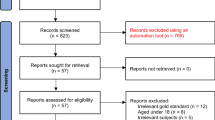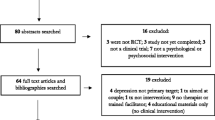Abstract
We examined whether women experiencing severe maternal morbidity (SMM) are more likely to be treated for a psychiatric illness or be prescribed psychotropic medications in the postpartum year than mothers who did not experience SMM. We also examine the relationship between SMM and specific mental health-related outcomes, and the relationship between specific SMM diagnoses/procedures and postpartum mental-health-related outcomes. The national registers in Sweden were used to create a population-based matched cohort. Every delivery with SMM between July 1, 2006, and December 31, 2012 (n = 8558), was matched with two deliveries without SMM (n = 17,116). Conditional logistic regression models assessed the relationship between SMM and postpartum mental health-related outcomes. Women who experienced SMM had significantly greater odds of being treated for a psychiatric disorder (aOR 1.22; 95% CI 1.03–1.45) and being prescribed psychotropic medications (aOR 1.40; 95% CI 1.24–1.58) in the postpartum year. Specifically, they had significantly greater odds of being treated for neuroses (aOR 1.35; 95% CI 1.09–1.69) and having a prescription for anxiolytics/hypnotics (aOR 1.36; 95% CI 1.18–1.58) or antidepressants (aOR 1.35; 95% CI 1.17–1.55). Women who were diagnosed with shock or uterine rupture/obstetric laparotomy during delivery had the greatest odds of postpartum mental health-related outcomes. This study identified mothers with SMM as a group at high risk for postpartum mental illness. Postpartum mental health services should be provided to ensure the well-being of these high-risk mothers.

Similar content being viewed by others
References
American College of Obstetricians and Gynecologists, Society for Maternal-Fetal Medicine, Kilpatrick SK, Ecker JL (2016) Severe maternal morbidity: screening and review. Am J Obstet Gynecol 215:B17–B22. https://doi.org/10.1016/j.ajog.2016.07.050
Austin P (2010) Statistical criteria for selecting the optimal number of untreated subjects matched to each treated subject when using many-to-one matching on the propensity score. Am J Epidemiol 172:1092–1097. https://doi.org/10.1093/aje/kwq224
Beck C (2001) Predictors of postpartum depression: an update. Nurs Res 50:275–285
Blom E, Jansen P, Verhulst F, Hofman A, Raat H, Jaddoe VWV, Coolman M, Steegers EAP, Tiemeier H (2010) Perinatal complications increase the risk of postpartum depression. The generation R study. BJOG An Int J Obstet Gynaecol 117:1390–1398. https://doi.org/10.1111/j.1471-0528.2010.02660.x
Brazauskas R, Logan B (2016) Observational studies: matching or regression? Biol Blood Marrow Transplant 22:557–563. https://doi.org/10.1016/j.bbmt.2015.12.005
Brendler-Lindqvist M, Norredam M, Hjern A (2014) Duration of residence and psychotropic drug use in recently settled refugees in Sweden—a register-based study. Int J Equity Health 13:1–9. https://doi.org/10.1186/s12939-014-0122-2
Centers for Disease Control and Prevention (2017) Severe maternal morbidity in the United States. https://www.cdc.gov/reproductivehealth/maternalinfanthealth/severematernalmorbidity.html. Accessed 28 Feb 2018
Chartier M, Brownell M, Issac M et al (2017) Is the families first home visiting program effective in reducing child maltreatment and improving child development? Child Maltreat 22:121–131
Easter A, Howard L, Sandall J (2018) Mental health near miss indicators in maternity care: a missed opportunity? A commentary. Br J Obs Gynaecol 125:649–651
Escobar G, Braveman P, Ackerson L et al (2001) A randomized comparison of home visits and hospital-based group follow-up visits after early postpartum discharge. Pediatrics 108:719–727. https://doi.org/10.1542/peds.108.3.719
Field T (2010) Postpartum depression effects on early interactions, parenting, and safety practices: a review. Infant Behav Dev 33:1–6. https://doi.org/10.1016/j.infbeh.2009.10.005
Fiest K, Jette N, Quan H et al (2014) Systematic review and assessment of validated case definitions for depression in administrative data. BMC Psychiatry 14:1–11. https://doi.org/10.1186/s12888-014-0289-5
Filippi V, Ganaba R, Baggaley R et al (2007) Health of women after severe obstetric complications in Burkina Faso: a longitudinal study. Lancet 370:1329–1337. https://doi.org/10.1016/S0140-6736(07)61574-8
Forray A (2016) Substance use during pregnancy. F1000Research 5:887. https://doi.org/10.12688/f1000research.7645.1
Furniss M, Conroy M, Filoche S, MacDonald EJ, Geller SE, Lawton B (2018) Information, support, and follow-up offered to women who experienced severe maternal morbidity. Int J Gynecol Obstet 141:384–388. https://doi.org/10.1002/ijgo.12454
Furuta M, Sandall J, Cooper D, Bick D (2014) The relationship between severe maternal morbidity and psychological health symptoms at 6 – 8 weeks postpartum: a prospective cohort study in one English maternity unit. Gen Hosp Psychiatry 24:1–14. https://doi.org/10.1016/S0163-8343(02)00189-5
Geller S, Rosenberg D, Cox S et al (2004) The continuum of maternal morbidity and mortality: factors associated with severity. Am J Obstet Gynecol 191:939–944. https://doi.org/10.1016/j.ajog.2004.05.099
Goffman D, Madden R, Harrison E et al (2007) Predictors of maternal mortality and near-miss maternal morbidity. J Perinatol 27:597–601. https://doi.org/10.1038/sj.jp.7211810
Gray K, Wallace E, Nelson K et al (2012) Population-based study of risk factors for severe maternal morbidity. Paediatr Perinat Epidemiol 26:506–514. https://doi.org/10.3174/ajnr.A1256.Functional
Hjern A, Vinnerljung B, Lindblad F (2004) Avoidable mortality among child welfare recipients and intercountry adoptees: a national cohort study. J Epidemiol Community Health 58:412–417
Lazariu V, Nguyen T, McNutt LA et al (2017) Severe maternal morbidity: a population-based study of an expanded measure and associated factors. PLoS One 12:1–13. https://doi.org/10.1371/journal.pone.0182343
Lindstrom K, Lindblad F, Hjern A (2009) Psychiatric morbidity in adolescents and young adults born preterm: a Swedish National Cohort Study. Pediatrics 123:e47–e53. https://doi.org/10.1542/peds.2008-1654
Meikle S, Kuklina E, Jamieson D et al (2009) Severe obstetric morbidity in the United States: 1998-2005. Obstet Gynecol 113:293–299. https://doi.org/10.1097/AOG.0b013e3181954e5b
Munk-Olsen T, Laursen T, Pedersen C et al (2011) Induced first-trimester abortion and risk of mental disorder. N Engl J Med 364:332–339
Norhayati M, Surianti S, Hazlina N (2015) Metasynthesis: experiences of women with severe maternal morbidity and their perception of the quality of health care. PLoS One 10:1–16. https://doi.org/10.1371/journal.pone.0130452
Pallasmaa N, Ekblad U, Gissler M (2008) Severe maternal morbidity and the mode of delivery. Acta Obstet Gynecol Scand 87:662–668. https://doi.org/10.1080/00016340802108763
Public Health Agency of Canada (2013) Severe maternal morbidity in Canada. Ottawa. In: ON
Shaw E, Levitt C, Wong S, Kaczorowski J (2006) Systematic review of the literature on postpartum care: effectiveness of postpartum support to improve maternal parenting, mental health, quality of life, and physical health. Birth 33:210–220. https://doi.org/10.1111/j.1523-536X.2006.00106.x
Song J, Chung K (2010) Observational studies: cohort and case-control studies. Plast Reconstr Surg 126:2234–2242
Statistics Sweden (2017) Population Statistics. http://www.scb.se/en/finding-statistics/statistics-by-subject-area/population/population-composition/population-statistics/. Accessed 7 Feb 2018
Sweden Institute (2018) Health Care in Sweden. https://sweden.se/society/health-care-in-sweden/. Accessed 7 Feb 2018
Urquia M, Wanigaratne S, Ray J, Joseph K (2017) Severe maternal morbidity associated with maternal birthplace: a population-based register study. J Obstet Gynaecol Canada 39:978–987. https://doi.org/10.1016/j.jogc.2017.05.012
Wahlberg Å, Rööst M, Haglund B, Högberg U, Essén B (2013) Increased risk of severe maternal morbidity (near-miss) among immigrant women in Sweden: a population register-based study. BJOG An Int J Obstet Gynaecol 120:1605–1611. https://doi.org/10.1111/1471-0528.12326
Warner R, Appleby L, Whitton A, Faragher B (1996) Demographic and obstetric risk factors for postnatal psychiatric morbidity. Demographic and Obstetric Risk Factors for Postnatal Psychiatric Morbidity 168:607–611. https://doi.org/10.1192/bjp.168.5.607
Wing JK (1994) Severe Mental Illness. In: Stevens A, Raftery J (eds) Health care needs assessment, the epidemiologically based needs assessment reviews. Radcliffe, Oxford, pp 159–237
Funding
This study was supported by funding from the Michael Smith Foreign Study Supplement; SLC is supported by a National Institute of Health Grant (NR017020), and MLU is supported by a Canada Research Chair in Applied Population Health. The funders had no role in study design; in the collection, analysis, and interpretation of data; in the writing of the report; and in the decision to submit the article for publication.
Author information
Authors and Affiliations
Contributions
EW conceived of the presented idea, conducted the analysis, and drafted the manuscript. SLC, MLU, CL, and AH made important intellectual contributions on severe maternal morbidity, reviewed the manuscript, and provided significant feedback. AH obtained the data. All authors discussed the results and contributed to the final manuscript.
Corresponding author
Ethics declarations
Conflict of interest
The authors declare that they have no conflict of interest.
Ethical approval
The Regional Ethics Committee in Stockholm approved this study (dnr: 2010/5:1); all data was anonymized and therefore did not require informed consent.
Electronic supplementary material
ESM 1
(DOCX 28 kb)
Rights and permissions
About this article
Cite this article
Wall-Wieler, E., Carmichael, S.L., Urquia, M.L. et al. Severe maternal morbidity and postpartum mental health-related outcomes in Sweden: a population-based matched-cohort study. Arch Womens Ment Health 22, 519–526 (2019). https://doi.org/10.1007/s00737-018-0917-z
Received:
Accepted:
Published:
Issue Date:
DOI: https://doi.org/10.1007/s00737-018-0917-z




